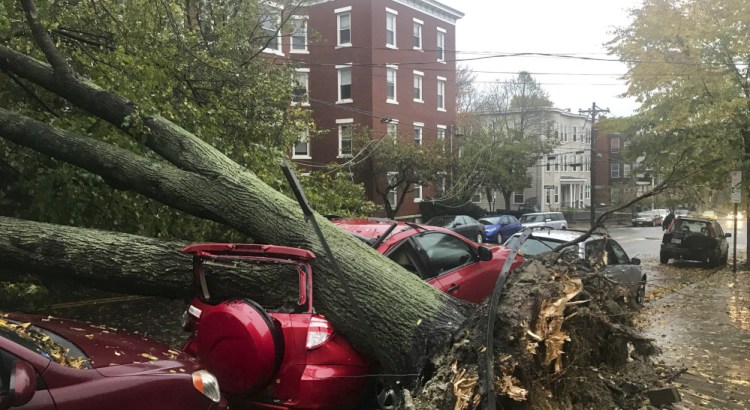The process of cleaning up after last week’s ferocious storm has made it all too obvious where our household preparations have fallen short. When you can’t see after dark because you don’t have fresh batteries for your flashlight, and you can’t get to the store to buy batteries because there’s no gas in your car, it’s a memorable lesson in the high cost of not preparing for climate change-related disaster – and one that the LePage administration will never learn.
The storm that struck Maine brought winds of up to 70 mph and enough rain to spur flash-flood warnings in some areas. Thousands of trees were blown down and ripped apart across Maine, contributing to outages that left nearly two-thirds of the state without power.
What does that have to do with climate change? To begin with, we know that Maine, like the rest of the country and the world, is getting warmer as greenhouse gases warm the planet. This feeds intense rainstorms that flow out to sea and are funneled into rivers rather than soaking into the soil. The higher temperatures also provide a welcoming environment for invasive insects that feed on trees already weakened by the lack of moisture.
The stage was set for something local tree experts say they haven’t seen before: widespread damage to leafy trees. “This is not normal, for so many deciduous trees to rip up from the base,” arborist Todd Robbins, assistant property manager at a 2,100-acre agricultural and forest preserve in Cape Elizabeth, told the Press Herald.
So while we can’t say that this particular storm was caused by climate change, it’s safe to conclude that climate change both increases the likelihood of severe weather and leaves us more vulnerable to the damage it does. Given the stakes, Maine officials should be spearheading a statewide effort to ensure that we’re ready for what’s coming.
But that’s not the way Paul LePage rolls. During his first campaign for governor, he suggested that climate change is an issue that’s been exaggerated to score political points, declaring: “I do not believe in the Al Gore science.” He scuttled the development of a state climate change adaptation strategy begun under the Baldacci administration. And he’s consistently made clear how low global warming ranks on his list of priorities – most recently in August, when he told Waterville Rotarians, without evidence, that the Earth actually has been cooling lately and shrugged off the idea that human activity has anything to do with climate change.
Left to fend for themselves, some Maine towns and cities have started preparing for the worst, elevating streets and changing building requirements in flood-prone areas and investing in things like larger culverts, through which water can pass more quickly.
But while it’s commendable for individual municipalities to tackle this task, homes, businesses and infrastructure in every Maine community should be protected. And that’s an endeavor that the state should shepherd, providing accurate climate data, working out costs and leveraging federal dollars to fund infrastructure improvements. This is the strategy being employed in New Hampshire, where the recommendations developed by a bipartisan state commission were adopted, with widespread support, in 2016.
Our neighboring state’s approach recognizes that disasters don’t discriminate on the basis of party affiliation. This should be – but won’t be – a model for the LePage administration, which, by politicizing and dismissing the climatic shifts that have made Maine more vulnerable to severe weather, has shamefully abdicated its responsibility to prepare Mainers for the disasters of the future.
Send questions/comments to the editors.



Success. Please wait for the page to reload. If the page does not reload within 5 seconds, please refresh the page.
Enter your email and password to access comments.
Hi, to comment on stories you must . This profile is in addition to your subscription and website login.
Already have a commenting profile? .
Invalid username/password.
Please check your email to confirm and complete your registration.
Only subscribers are eligible to post comments. Please subscribe or login first for digital access. Here’s why.
Use the form below to reset your password. When you've submitted your account email, we will send an email with a reset code.